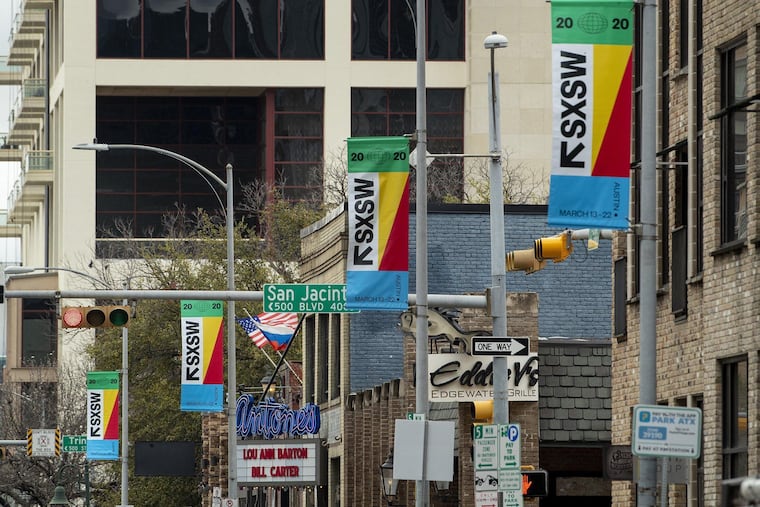SXSW coronavirus cancellation upends Philly tech promo plans
Philadelphia figured in the calculus — in a negative way. “Austin, don’t be Philadelphia 1918,” pleaded a Texas securities trader, referring to the Spanish flu outbreak that spread rapidly after city officials failed to cancel a massive parade.

Philadelphia’s technology community is hurting over the decision by officials in Austin, Texas, to cancel this year’s spring SXSW tech and cultural event, yet another casualty of the coronavirus.
“With a heavy heart” leaders of Amplify Philly spread the disappointing word Friday. The cancellation of the wildly popular event robs city boosters, tech start-up hopefuls, and independent film producers of one of the year’s great display and networking opportunities.
Amplify had expected more than 400 people from the area to join its fifth visit to SXSW, and fill “Amplify Philly House” and other venues for planned events — like a DJ Jazzy Jeff house party, a pop-up Rival Bros. coffee bar and coworking space from Cambridge Innovation Center, instant-print T-shirts from Fine Line Print Station, and start-up presentations backed by PHL Innovation Picnic and Comcast LIFT Labs.
“We were especially excited” by this year’s beefed-up college presence, said Michelle Freeman, CEO of Witty Gritty LLC, an event management company in Philadelphia. She noted that promotional outfit Amplify Philly has reorganized as a nonprofit and plans to boost the city’s profile elsewhere.
“We are still understanding our next steps,” said David Silver, cofounder of the RecPhilly artists’ space and a leader of Amplify Philly, an effort backed by dozens of area groups, including Jefferson Health and South Philly robot maker Exyn Technologies.
Philadelphia has been ramping up its presence at SXSW each year, using the exposure to market the city as a thriving hub for tech start-ups and creatives.
“The cancellation of SXSW, while disappointing, is understandable in light of current circumstances,” said Kevin Lessard, spokesperson for the city’s Commerce Department, in an email. “With 75,000-plus expected attendees, SXSW represented a unique opportunity to promote Philadelphia as a global place for business and innovation to a massive audience, and to highlight why companies should invest and open up in our city.”
“We’re looking into ways to help #Los Angeles and #Philadelphia filmmakers who were affected,” wrote the organizers of First Glance Film Festivals, which gave awards last year to a string of Philly filmmakers who were hoping to exhibit in Austin.
“ ‘The show must go on’ is in our DNA, and this is the first time in our 34-year history that the March events will not take place,” lamented SXSW organizers in their statement Friday, after city officials bowed to public pressure, reversed their claims that the public faced no extra danger from COVID-19 by gathering in the tens of thousands, and canceled the yearly extravaganza in Texas’ capital city.
Philadelphia figured in the calculus — in a negative way.
“Austin, don’t be Philadelphia 1918,” pleaded a Texas securities trader who goes by the online name Barton, one of many who flooded social media with similar warnings in the days before Friday’s cancellation announcement.
He was referring to the lethal 1918 Spanish flu epidemic, which spread rapidly in Philadelphia after city officials declined to cancel a mass public parade. Stephanie McDonald, owner of Bombshell Girls Fitness in Austin, was among the residents there to cite Philadelphia’s unfortunate example. She urged Texas Gov. Greg Abbott to “overrule” Austin Mayor Steve Asher, who had resisted calls to cancel SXSW.
McDonald was one of many who retweeted Kenneth C. Davis’ 2018 Smithsonian article chronicling city politicians’ determination to hold “the biggest parade Philadelphia had ever seen” to sell bonds financing America’s World War I campaigns, despite doctors’ advice to avoid public gatherings that would spread the deadly virus.
“Within 72 hours of the parade, every bed in Philadelphia’s 31 hospitals was filled. In the week ending Oct. 5, some 2,600 people in Philadelphia had died from the flu or its complications," wrote Davis. "A week later, that number rose to more than 4,500. With many of the city’s health professionals pressed into military service, Philadelphia was unprepared for this deluge of death,” that in time killed over 12,000 city residents, 675,000 Americans, and millions worldwide.
Balaji S. Srinivasan, a San Francisco tech company founder turned venture capitalist, wrote that he realized a lot of money was at stake for SXSW hosts and exhibitors alike. But, he added, “holding an event with huge numbers of people in the middle of a pandemic fills hospitals first, and then cemeteries.”